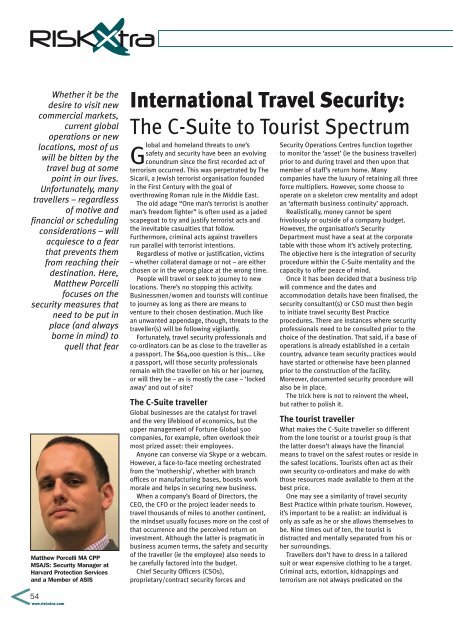RiskXtraDecember2018
Create successful ePaper yourself
Turn your PDF publications into a flip-book with our unique Google optimized e-Paper software.
x<br />
RISKXtra<br />
Whether it be the<br />
desire to visit new<br />
commercial markets,<br />
current global<br />
operations or new<br />
locations, most of us<br />
will be bitten by the<br />
travel bug at some<br />
point in our lives.<br />
Unfortunately, many<br />
travellers – regardless<br />
of motive and<br />
financial or scheduling<br />
considerations – will<br />
acquiesce to a fear<br />
that prevents them<br />
from reaching their<br />
destination. Here,<br />
Matthew Porcelli<br />
focuses on the<br />
security measures that<br />
need to be put in<br />
place (and always<br />
borne in mind) to<br />
quell that fear<br />
Matthew Porcelli MA CPP<br />
MSAJS: Security Manager at<br />
Harvard Protection Services<br />
and a Member of ASIS<br />
International Travel Security:<br />
The C-Suite to Tourist Spectrum<br />
Global and homeland threats to one’s<br />
safety and security have been an evolving<br />
conundrum since the first recorded act of<br />
terrorism occurred. This was perpetrated by The<br />
Sicarii, a Jewish terrorist organisation founded<br />
in the First Century with the goal of<br />
overthrowing Roman rule in the Middle East.<br />
The old adage “One man’s terrorist is another<br />
man’s freedom fighter” is often used as a jaded<br />
scapegoat to try and justify terrorist acts and<br />
the inevitable casualties that follow.<br />
Furthermore, criminal acts against travellers<br />
run parallel with terrorist intentions.<br />
Regardless of motive or justification, victims<br />
– whether collateral damage or not – are either<br />
chosen or in the wrong place at the wrong time.<br />
People will travel or seek to journey to new<br />
locations. There’s no stopping this activity.<br />
Businessmen/women and tourists will continue<br />
to journey as long as there are means to<br />
venture to their chosen destination. Much like<br />
an unwanted appendage, though, threats to the<br />
traveller(s) will be following vigilantly.<br />
Fortunately, travel security professionals and<br />
co-ordinators can be as close to the traveller as<br />
a passport. The $64,000 question is this… Like<br />
a passport, will those security professionals<br />
remain with the traveller on his or her journey,<br />
or will they be – as is mostly the case – ‘locked<br />
away’ and out of site?<br />
The C-Suite traveller<br />
Global businesses are the catalyst for travel<br />
and the very lifeblood of economics, but the<br />
upper management of Fortune Global 500<br />
companies, for example, often overlook their<br />
most prized asset: their employees.<br />
Anyone can converse via Skype or a webcam.<br />
However, a face-to-face meeting orchestrated<br />
from the ‘mothership’, whether with branch<br />
offices or manufacturing bases, boosts work<br />
morale and helps in securing new business.<br />
When a company’s Board of Directors, the<br />
CEO, the CFO or the project leader needs to<br />
travel thousands of miles to another continent,<br />
the mindset usually focuses more on the cost of<br />
that occurrence and the perceived return on<br />
investment. Although the latter is pragmatic in<br />
business acumen terms, the safety and security<br />
of the traveller (ie the employee) also needs to<br />
be carefully factored into the budget.<br />
Chief Security Officers (CSOs),<br />
proprietary/contract security forces and<br />
Security Operations Centres function together<br />
to monitor the ‘asset’ (ie the business traveller)<br />
prior to and during travel and then upon that<br />
member of staff’s return home. Many<br />
companies have the luxury of retaining all three<br />
force multipliers. However, some choose to<br />
operate on a skeleton crew mentality and adopt<br />
an ‘aftermath business continuity’ approach.<br />
Realistically, money cannot be spent<br />
frivolously or outside of a company budget.<br />
However, the organisation’s Security<br />
Department must have a seat at the corporate<br />
table with those whom it’s actively protecting.<br />
The objective here is the integration of security<br />
procedure within the C-Suite mentality and the<br />
capacity to offer peace of mind.<br />
Once it has been decided that a business trip<br />
will commence and the dates and<br />
accommodation details have been finalised, the<br />
security consultant(s) or CSO must then begin<br />
to initiate travel security Best Practice<br />
procedures. There are instances where security<br />
professionals need to be consulted prior to the<br />
choice of the destination. That said, if a base of<br />
operations is already established in a certain<br />
country, advance team security practices would<br />
have started or otherwise have been planned<br />
prior to the construction of the facility.<br />
Moreover, documented security procedure will<br />
also be in place.<br />
The trick here is not to reinvent the wheel,<br />
but rather to polish it.<br />
The tourist traveller<br />
What makes the C-Suite traveller so different<br />
from the lone tourist or a tourist group is that<br />
the latter doesn’t always have the financial<br />
means to travel on the safest routes or reside in<br />
the safest locations. Tourists often act as their<br />
own security co-ordinators and make do with<br />
those resources made available to them at the<br />
best price.<br />
One may see a similarity of travel security<br />
Best Practice within private tourism. However,<br />
it’s important to be a realist: an individual is<br />
only as safe as he or she allows themselves to<br />
be. Nine times out of ten, the tourist is<br />
distracted and mentally separated from his or<br />
her surroundings.<br />
Travellers don’t have to dress in a tailored<br />
suit or wear expensive clothing to be a target.<br />
Criminal acts, extortion, kidnappings and<br />
terrorism are not always predicated on the<br />
54<br />

















